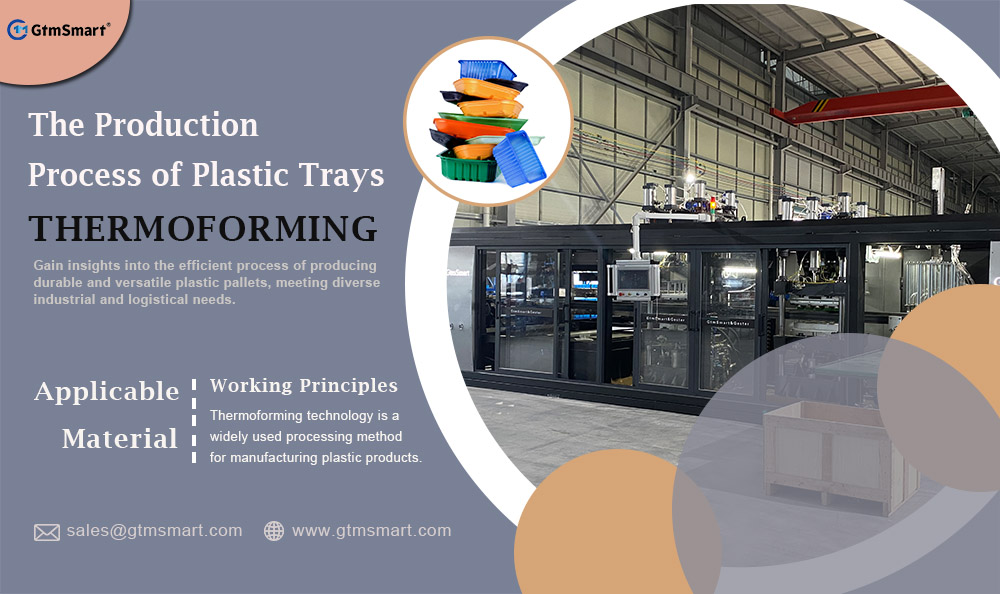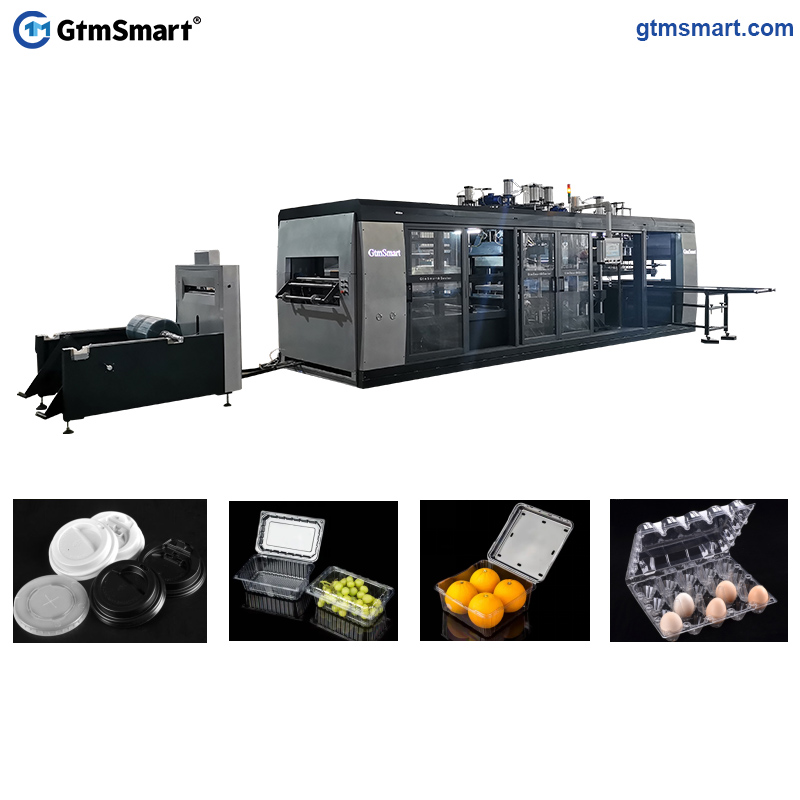
The Production Process of Plastic Trays
I. Introduction
In the modern logistics and packaging industry, plastic trays have become an indispensable part due to their lightweight and durable characteristics. Among these, thermoforming technology plays a crucial role. This article will delve into the pivotal role of thermoforming machines in the production process of plastic trays, unraveling the manufacturing process from principles to practice.
II. Working Principles of Thermoforming MachinesThermoforming technology is a widely used processing method for manufacturing plastic products. It is applicable to various types of plastics, including polyethylene (PE), polypropylene (PP), polyvinyl chloride (PVC), and others.
The fundamental principle of this technology is to heat plastic sheets above their softening point, making them pliable, and then using external force to press them into pre-designed molds, ultimately forming the desired product shape. Plastic thermoforming machines typically consist of several main parts, including heating systems, forming systems, cooling systems, and control systems. The heating system is responsible for heating the plastic sheets to the appropriate forming temperature, while the forming system includes molds, forming platforms, and forming devices used to shape the heated plastic sheets into the desired form. The cooling system is used to rapidly cool and solidify the formed products to maintain their shape and dimensional stability. The control system monitors and adjusts parameters such as temperature, pressure, and time throughout the forming process to ensure product quality and consistency.
III. Design of Plastic Trays
Before designing plastic trays, it is essential to clarify the usage requirements, including the types of goods to be carried, weight ranges, and environmental factors. Based on these requirements, determining the size and load-bearing capacity of the tray is crucial. Size selection should consider the dimensions of the goods, storage space limitations, and requirements of logistics transportation equipment. Meanwhile, the load-bearing capacity of the tray should be able to accommodate the weight of the goods to be carried with a certain safety margin to ensure stability and safety during use.
IV. Material Selection
Thermoforming technology can be applied to various plastic materials, commonly including polystyrene (PS), polyethylene terephthalate (PET), high-impact polystyrene (HIPS), polypropylene (PP), polylactic acid (PLA), and others. These materials exhibit good flowability and molding properties during the thermoforming process, suitable for producing various shapes of plastic products, including trays.
1. Polystyrene (PS): PS has good transparency and gloss, suitable for producing transparent plastic products, but it has poor impact resistance and is prone to brittle fracture.
2. Polyethylene Terephthalate (PET): PET has excellent mechanical properties and heat resistance, suitable for producing heat-resistant plastic products but is not resistant to acid and alkali.
3. High-Impact Polystyrene (HIPS): HIPS has good impact resistance and rigidity, suitable for producing plastic products requiring high impact resistance.
4. Polypropylene (PP): PP has good heat resistance and chemical stability, suitable for producing chemical-resistant and heat-resistant plastic products.
5. Polylactic Acid (PLA): PLA is a biodegradable plastic material with good environmental friendliness, but it has poor mechanical properties and heat resistance, suitable for producing disposable plastic products.
Considering the usage requirements and performance needs of plastic trays, it is crucial to comprehensively evaluate the advantages and disadvantages of different materials to select the most suitable material for tray production.
V. Process of Making Plastic trays with Thermoforming Machines
In the process of manufacturing plastic trays, the sheet undergoes pre-treatment before entering the heating furnace. The heating furnace is a critical step, preparing the sheet for the subsequent forming process by heating it to the appropriate softening temperature. Temperature control is crucial during heating to ensure that the plastic sheet reaches the proper softening state while avoiding overheating that may cause material degradation or heat damage. Next, the heated plastic sheet is transferred to the forming station for molding. The forming station is the core of the entire manufacturing process, where plastic tray making machines precisely shape the plastic sheet into trays with the desired shape and dimensions.
During the forming process, various factors such as mold design, pressure control, and forming time need to be considered to ensure the final product’s quality and stability. After forming, the trays are transferred to the cutting station for separation into individual products. The accuracy and efficiency of this step are crucial for the quality and production speed of the final products. Subsequently, the products enter the stacking station, where mechanical arms or other automated equipment are often used to stack the finished products. Proper stacking techniques ensure compact and stable product stacking, maximizing storage space utilization and ensuring product safety during transportation. Finally, at the end of the line is the waste material winding machine, responsible for handling the waste generated during the production process by winding it into rolls for further recycling or disposal. The operation of the waste material winding machine effectively reduces the environmental impact of waste, aligning with the principles of environmental protection and sustainability.
VI. Exploring the Applications of Plastic Trays
Plastic trays offer advantages such as lightweight, durability, and ease of cleaning. Furthermore, plastic trays are flexible in design and resistant to moisture and deformation. As versatile storage containers, plastic trays find widespread applications in various fields. Primarily, they are commonly used in warehousing and storage. Whether in factories, warehouses, or retail stores, plastic trays are used to store and organize various goods and items, improving storage efficiency and management convenience.
Moreover, plastic trays are widely used in processing and production processes. In the manufacturing industry, plastic trays serve as supports on workstations or assembly lines, aiding in organizing and transporting parts, tools, or finished products, thereby enhancing production efficiency and overall workflow arrangement.
Analysis of the Advantages of Thermoforming Technology in Plastic Tray Manufacturing
Plastic tray machine offers an efficient and precise molding process, capable of producing plastic tray products with complex shapes and precise dimensions. It is adaptable to various plastic materials such as polyethylene, polypropylene, etc., offering flexibility to meet different customer needs. Additionally, thermoforming technology offers advantages such as low cost, high efficiency, and environmental friendliness. Compared to traditional molding methods, it offers better economic and sustainability benefits.
In the future, with the development of the logistics and transportation industry, the demand for plastic trays will continue to grow. The application of thermoforming technology in plastic tray manufacturing will become more widespread, highlighting its advantages in improving product quality, reducing production costs, and minimizing resource waste. Simultaneously, with technological advancements and increasing environmental awareness, thermoforming technology will continue to innovate, driving the plastic tray manufacturing industry towards greater intelligence, efficiency, and environmental friendliness.
Conclusion
Plastic trays, as versatile storage and transportation tools, have demonstrated their importance and value in various fields. Whether in industrial production to enhance efficiency or in daily life to provide convenience, plastic trays play an irreplaceable role. With continuous technological progress and expanding applications, we can expect plastic trays to continue unleashing more innovative potential, bringing greater convenience and benefits to people’s production and life.
Media Contact
Company Name: GTMSMART Machinery Co., Ltd.
Email: Send Email
Country: China
Website: https://www.gtmsmart.com/

